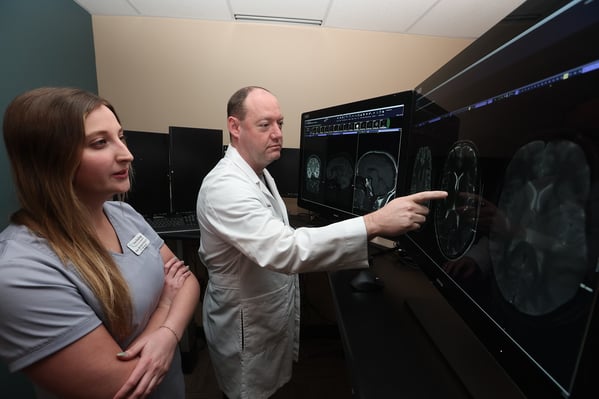Reasons to Celebrate
Each year during the week of November 8, we celebrate National Radiologic Technology week to highlight the vital role radiologic technologists (RTs) play in patient care and safety. The American Society of Radiologic Technologists chose November 8 to coincide with the anniversary of the discovery of X-rays by Wilhelm Conrad Roentgen in 1895. Notably, the week also includes the birthday of Marie Curie. Among other important accomplishments, Curie developed portable X-ray machines to be used in the battlefield during World War I. She not only trained 150 women—the world’s first battlefield radiologic technologists—to operate the machines, but also joined them on the battlefield to help treat wounded soldiers.
History of the Profession
In the early days of medical X-rays, doctors often relied on assistants who had no medical training to assist in operating the imaging equipment, and techniques were typically based on these assistants’ best guesses. As a result, image quality was inconsistent, and radiation protection was largely nonexistent. In 1920, fourteen X-ray technicians (half of them women) met in Chicago to form the American Association of Radiological Technicians, the first professional organization of its kind. This paved the way for shared knowledge and standardization of radiological imaging techniques, making the practice more effective for patient care and safer for RTs and patients alike.
Radiologic Technology Today
Today, becoming an RT requires specific rigorous training. Candidates must earn an associate or more advanced degree from an accredited institution, pass national exams, and engage in continuing education to maintain their certification. Training includes instruction in radiation safety, anatomy, patient positioning and examination techniques, equipment protocols, and patient care. A registered RT can choose to specialize in specific radiologic applications, such as CT, mammography, or radiation therapy, but a specialty is not required.
To be successful, radiologic technologists need not only technical knowledge but also compassion for patients, who are often in physically and emotionally vulnerable states when receiving care. The nature of the work means that RTs’ interactions with patients can have a profound influence on patients’ health care experiences. An RT who understands that an individual might be incredibly anxious about exam results, claustrophobic in an MRI machine, or physically uncomfortable as a result of positioning required for quality images and takes steps to make the process as comfortable as possible under the circumstances shapes a very different experience than one who simply applies their technical knowledge—however expert that knowledge may be.
At Iowa Radiology, we appreciate the hard work, dedication, and compassion that the RTs on our team demonstrate every day. Tasked with keeping up to date on the latest imaging technology while delivering excellent patient care and applying expert technical knowledge, they play an indispensable role in providing the high quality medical care upon which we pride ourselves.
Sources
History of the American Society of Radiologic Technologists. ASRT.org. https://www.asrt.org/main/about-asrt/asrt-history. Published July 27, 2007. Accessed October 2, 2019.
Jorgensen, Timothy J. How Marie Curie Brought X-Ray Machines to the Battlefield. Smithsonian.com. https://www.smithsonianmag.com/history/how-marie-curie-brought-x-ray-machines-to-battlefield-180965240/ October 11, 2017. Accessed October 2, 2019.
National Radiological Technology Week 2019. ASRT.org. https://www.asrt.org/events-and-conferences/nrtw. Accessed October 2, 2019.



